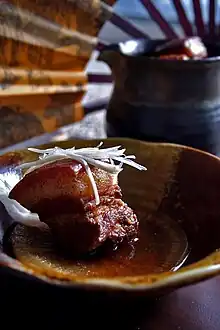Dongpo pork
Dongpo pork (simplified Chinese: 东坡肉; traditional Chinese: 東坡肉; pinyin: dōngpōròu), also known as Dongpo meat,[1] is a Hangzhou dish[2] that is made by pan-frying and then red-cooking pork belly.[3] The pork is cut thick, about 5 centimeters (2.0 in) square, and should consist equally of fat and lean meat. The skin is left on. The mouthfeel is oily but not greasy and the dish is fragrant with wine. The dish is named after the Song Dynasty poet and gastronome Su Dongpo.[4]
| Dongpo pork | |||||||||||
|---|---|---|---|---|---|---|---|---|---|---|---|
 | |||||||||||
| Chinese name | |||||||||||
| Simplified Chinese | 东坡肉 | ||||||||||
| Traditional Chinese | 東坡肉 | ||||||||||
| |||||||||||
| Japanese name | |||||||||||
| Kana | ドンポーロウ | ||||||||||
| Katakana | トンポーロウ | ||||||||||
| |||||||||||
Origins
Legend has it that during Su Dongpo's life of poverty during his banishment to Hangzhou, he improved on the traditional process. He first braised the pork, added huangjiu (yellow wine) to make red-braised pork, then slowly stewed it on low heat. In their scholarly work Chinese Gastronomy, Lin Hsiang Ju and Lin Tsuifeng give the recipe "The Fragrance of Pork: Tungpo Pork", and remark that the "square of fat is named after Su Tungpo, the poet, for unknown reasons. Perhaps it is just because he would have liked it."[5]
See also
- Kakuni – Japanese braised pork dish
- Humba – Filipino braised pork dish
- Red braised pork belly – Chinese braised pork dish
- List of pork dishes
References
- Sakaki, Atsuko (2005). Obsessions with the Sino-Japanese Polarity in Japanese Literature. University of Hawaii Press. p. 87. ISBN 978-0-8248-2918-6.
- Cannon, Gwen, ed. (2010). Michelin Must Sees Shanghai. London: Michelin Apa Publications. p. 133. ISBN 978-1-906261-99-3.
- Yoke, Wong Ah (May 8, 2016). "Video: How to make braised Dongpo pork". The Straits Times. Retrieved June 24, 2019.
- Law, Eugene (2004). Intercontinental's best of China. Beijing: China Intercontinental Press. p. 336. ISBN 978-7-5085-0429-2.
- Hsiang-Ju Lin and Tsuifeng Lin, with a Foreword and Introduction by Lin Yutang, Chinese Gastronomy. New York,: Hastings House, 1969. ISBN 0-8038-1131-4; various reprints), p 55.